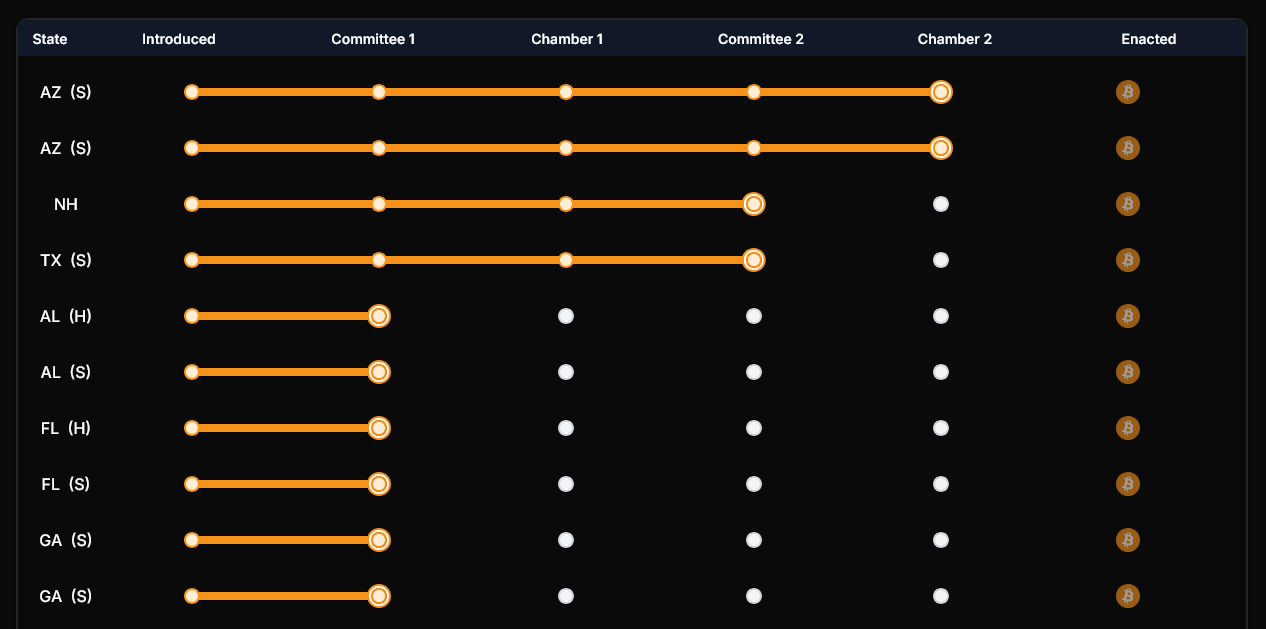
Key Points
- Arizona Crypto Reserve Bill Faces Final Vote Amid Veto Threat
- Arizona’s SB 1373 clears House committee, heads for final vote
- The bill proposes a state-run digital asset reserve fund
- State treasurer could invest up to 10% in crypto annually
- Governor Hobbs’ veto spree threatens bill’s survival
Arizona is making bold moves in the crypto space. On April 17, the House Committee of the Whole passed the Arizona Crypto Reserve Bill (SB 1373)—a major step forward in integrating digital assets into public financial infrastructure. With just one more vote needed, the bill is on the brink of heading to Governor Katie Hobbs’ desk for final approval.
SB 1373 proposes the creation of a Digital Assets Strategic Reserve Fund, composed of digital assets seized through criminal proceedings. The fund would be managed by the state’s treasurer, who could invest up to 10% of the fund’s value into digital assets per fiscal year. The bill also allows the treasurer to loan out these assets to generate returns, so long as it doesn’t heighten financial risk.
ARIZONA Update:
Bitcoin Reserve Bill SB 1373 has been passed by the House Committee of the Whole (with a minor amendment).
The next step is Third Reading and final floor vote. pic.twitter.com/oOahjbZATR
— Bitcoin Laws (@Bitcoin_Laws) April 17, 2025
This legislative push comes amid growing momentum among U.S. states to build crypto-backed reserves as part of their financial strategies. Arizona is clearly signaling its ambition to be a front-runner in this space.
SB 1373 is not a standalone initiative. It’s running parallel to another ambitious proposal—SB 1025, also known as the Arizona Strategic Bitcoin Reserve Act. This bill proposes that both the state treasury and retirement systems invest up to 10% of their funds in Bitcoin, adding further strength to Arizona’s crypto-first vision.
The strategic direction is reminiscent of recent moves in the broader market where Bitcoin is quietly stabilizing financial systems, as discussed in this analysis on Bitcoin ETFs reducing crypto volatility in 2025.
WATCH: Arizona House Committee of the Whole passes Bitcoin Reserve Bills (SB 1025 and SB 1373).
The next steps are Third Reading, followed by a final House vote.
If they pass, then it’s to the Governor’s desk for signing. pic.twitter.com/opL14xL3Ol
— Bitcoin Laws (@Bitcoin_Laws) April 2, 2025
Political hurdles and the national crypto reserve race
Despite the legislative wins, the Arizona Crypto Reserve Bill faces a major challenge—Gov

Race to establish a Bitcoin reserve at the state level. Source: Bitcoin Laws – Techtpken
s has pledged to veto all bills until the state legislature approves funding for disability services. She’s also been on a recent veto spree, rejecting 15 bills just this week, many of which had bipartisan support. That’s left lawmakers uncertain about the fate of SB 1373, even if it passes the final House vote.
Arizona isn’t alone in this game. States like Texas, Utah, and New Hampshire are also exploring the idea of Bitcoin reserves at the state level. Texas passed a Bitcoin reserve bill in early March. Utah tried but removed the key reserve component before final approval. New Hampshire’s House has also greenlit a similar bill.
Arizona, however, is going one step further—not only including Bitcoin, but expanding the scope to include other digital assets seized through legal proceedings. This gives it a more flexible and forward-looking approach, especially as institutional acceptance of crypto grows. We’ve seen similar moves globally, where leading exchanges like Binance are helping governments with crypto reserve strategies, as highlighted in this report on Binance and national Bitcoin reserves.
Office and HQ are old concepts like SMS and MMS. Time is moving on…
— CZ 🔶 BNB (@cz_binance) November 20, 2019
This strategic thinking aligns with shifts in macroeconomic models, where traditional metrics like global M2 money supply may no longer provide accurate crypto forecasts, as explained in this breakdown on misleading global M2 data.
On the tech infrastructure side, blockchain networks like Base are rapidly improving scalability to support future adoption. Base’s Q2 roadmap includes upgrades like 200ms block times and major efficiency gains—setting the stage for more real-world use of digital assets in government and enterprise systems.
As Arizona lawmakers fight to pass these bills, the crypto industry continues to evolve rapidly around them. Public platforms and regulatory actors are debating key issues like token credibility and investor risk, seen in recent controversies such as Coinbase’s memecoin promotion backlash.
Why Arizona’s move matters now
If the Arizona Crypto Reserve Bill passes and gains the Governor’s signature, Arizona could become the first U.S. state to establish a formal, broad-based digital assets reserve, backed by law. Unlike some states limiting their focus to Bitcoin alone, Arizona is embracing the diversity and potential of crypto.
That could signal a massive shift in how states treat crypto—not just as an investment opportunity, but as a strategic financial tool.
And with billions already invested in Bitcoin ETFs, rising state-level interest, and a more mature infrastructure to support digital assets, Arizona’s moves could become a blueprint for others.
But it all hangs on one final vote—and one signature.














